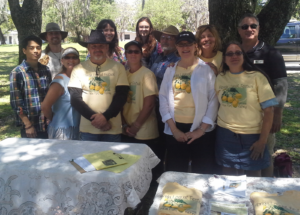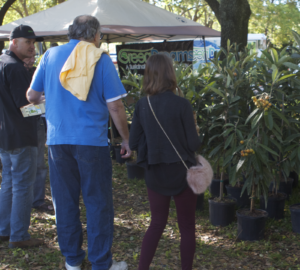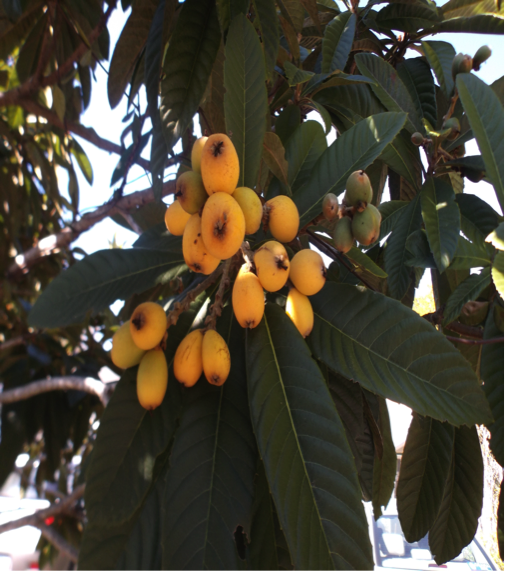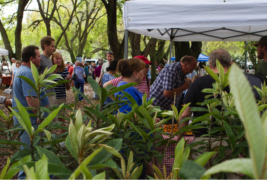Celebrating Florida’s Urban Fruit
An Ecology Florida/Friendship Farms & Fare Annual Event
The Florida Loquat Festival
Fifth Anniversary
America’s Only Loquat Festival
March 24, 2018
9:00 a.m. to 2:00 p.m.
Frances Avenue Park
New Port Richey
Commemorative Brochure
The Florida Loquat Festival: Celebrating Florida’s Urban Fruit
Fifth Annual Celebration
March 24, 2018
Tentative Program
10:00
Welcome and Introduction
Dell deChant, University of South Florida
Florida Loquat Day Proclamation of the City Of New Port Richey
Supporters’ Recognition
10:30
Loquats and Traditional Medicine
David Maharajah , Maharajah Acupuncture & Herb Shoppe
11:30
Loquats and Me: A Loquat Adventure From Farm To Table
Sylvia Spencer, Habitat for Humanity, Community Garden
12:00
“The Tree Itself”
Loquats in planned food producing ecosystems
Pete Kanaris, Green Dreams
12:30
Loquats In Our Home, Dell deChant
1:00
Loquat Literary Festival: “Leaves of Loquat” – Ryan Chen, Facilitator
Poetry Readings and Awards
1:45
Concluding Comments
Supporters’ Recognition and Thanks
Music during breaks in the program shared by Music by Carolyn

Carolyn Yates. Guitarist
Welcome to the Fifth Annual Florida Loquat Festival
The 2018 Florida Loquat Festival is Saturday March 24, at Frances Avenue Park in New Port Richey. The fifth annual festival welcomes loquat enthusiasts and those interested in learning about the fruit from around the state. This special festival edition of Loquat News, is available to subscribers in advance and to attendees at the event.
The Florida Loquat Festival is a learning and sharing event dedicated to expanding knowledge and appreciation of the Loquat Tree and its fruit. Loquat seeds, saplings, and young trees will be available for purchase. To the extent that they are available, Loquat food products will also offered, including fresh fruit, preserves, and other specialties.
Although loquats have been grown in Florida over well over a century, this is the only event dedicated to celebrating, discovering, and learning about this wonderful fruit. In fact, it may be the only Loquat Festival in the United States.
What To Look For At the Festival
Trees, Trees, Trees

This year’s festival will feature trees, from seedlings and saplings to large trees. Our major focus will be a wide array of cultivars, offered by Green Dreams – A Sustainable Solutions Company. Green Dreams is a major force in the sustainable food and culture movement, offering a wide assortment of organic fruit trees, suitable for Florida growing We encourage folks to visit the Green Dreams’ website, and see all that they have to offer https://www.greendreamsfl.com/
Green Dreams has been the festival’s primary nursery for several years, and this year it will 0ffer its widest selection yet of high-quality named varieties. All told, we’ll have close to 150 trees, with nearly 120 coming from Green Dreams. These will include some of each of these varieties:
Premier Golden Nugget Bradenton
Christmas Oliver Champaign
Sherry Yehuda
We are particularly pleased to have the hard-t0-find Yehuda this year. This is the first year we have been able to make it available and Green Dreams’ proprietor, Pete Kanaris, reports that he’ll have a good supply . All Green Dreams trees will be in 3 gallon pots, for $45.
Other nurseries will have smaller trees lower prices – including seedlings for $5.
For best selection of the trees, please come early.
Anything Else?
Fruit & Preserves
We’d love to say we’ll have lots of fresh fruit and preserves. That will not be the case this year. A January freeze impacted fruit development in our main production area – the Springs Coast Watershed.
We will have some preserves and it is likely that we’ll have some fresh fruit as well. There will just not be as much as previous years.
As with other fruit festivals, Loquat fruit production is subject to weather conditions – and this year (for the first time in the history of the festival) we had a freeze that was severe enough to impact fruit development.
The trees are fine. They can withstand temperatures to 10 degrees. The fruit is another story. Sources vary somewhat, but research reveals that the flowers and young fruit is damaged when temperatures reach 25 to 27 degrees – with most sources citing 27 degrees.
Well, we did get to 27 degrees in most parts of the Springs Coast – and even further south. We recorded a low of 28.4 degrees at one of our growing sites, but temperatures were likely lower in other areas.
So, this year there will not be as much fruit as we would like and there will also be a smaller quantity of preserves. As with the trees, come early for best selection.
Although we’d love to have plenty of loquat jellies and jams, this is unlikely – and to compensate for our missing loquats, organizers have decided to offer other preserves. In cooperation with local artisan canners, this year only, we will work to be sure that visitors will be able to enjoy high quality locally-produced preserves.
Continuing our commitment to agrarian principles and work to develop local food sours, all our preserves will be made by local artisan canners.
Educational Presentations
As you can see from the program, an important part of the festival is education. Presentations will include instructions on growing and cultivation of Loquat trees, how to eat its fruit, recipes based on loquats, the role of the loquat in sustainable farming and permaculture gardening, and the cultural context of this wonderful tree.
Loquat Literature
Continuing a wonderful tradition, we are again featuring a loquat literary festival: Leaves of Loquat. The festival is an open presentation of creative literary works taking the loquat as subject or central image. Leaves of Loquat is also a literary journal, founded by the poet laureate of the Florida Loquat Festival, Wendy Buffington, and continued today by Ryan Chen.

Please consider acquiring a copy of Leaves of Loquat, available for donations here at the festival, and stay for the literary festival that begins at 1:00 p.m.
Acknowledgement of Sponsors and Supporters
Without the interest and support of a community, events like the Florida Loquat Festival cannot happen. In the spirit of community and nurturing support, and in addition to festival’s founding and sponsoring organizations, Ecology Florida and Friendship Farms & Fare, The Florida Loquat Festival appreciates and celebrates these supporters – and we encourage you to support them in their commitment to the festival and restoring a sustainable world.
Exclusive Sponsors
Ecology Florida
Friendship Farms & Fare
Premier Supporter
Suncoast Credit Union
Major Event Supporters
The Hook Law Group
The Rotary Club of New Port Richey
Contributing Supporters
Maharajah Acupuncture and Herb Shoppe
S.I. Electric
People Places
Natural Choice Pest Control
Wright’s Natural Market
West Pasco Habitat for Humanity
City of New Port Richey
deChant Public Relations
NewsPortRichey
Participating Supporters
Rose’s Bistro Off Main
Creative Institute for Dental Arts
FarmNet
Environmental Committee of the City of New Port Richey
East Madison Growers Club
Grand Gardens
New Port Richey Public Library
Tasty Tuesdays
Parks & Recreation Department of the City of New Port Richey
FAQ
How can I grow a loquat tree?
One option is to wrap about 20 loquat seeds (the more seeds the better your chances of successful germination) in damp paper towels and places them in a sunny window area that is warm. Check for any sprouted seeds. Plant any sprouted seeds in a small container. Before planting, fill the container with water, soil, and peat moss. Keep the soil moist but make sure the bottom is never standing in water. Transplant the tree in early spring when it is more than 6 to 7 inches tall.
How long will my tree take to produce loquats?
On average, loquats should begin to bear in 2 to 3 years. Grafted trees will produce even sooner – even within the same year as they are planted.
Do loquats offer any health benefits?
Yes! The loquat leaf from the tree releases antioxidants, combats diabetes, supports the pancreas, assists the liver in detoxifying chemicals, and fights against skin inflammation.
How long does a loquat take to reach maturity?
About 90 days from full flower opening
When can I expect my tree to be ready to harvest? Florida harvest season is typically February to May.
Can I pick them while they are green?
You can, but don’t expect to eat them. Once you pick the loquat it will stay in the state you pick it. Therefore if you pick it in its green state it will not eventually turn orange. Its best to wait it out!
Supporters, Vendors, and Volunteers at 2016 Florida Loquat Festival
Select Loquat Tree Varieties Common to Florida
compiled by Shelby Smith
According to Osceola County Extension Agent Eleanor Foerste, the loquat does exceptionally well in yards that are cramped in space with full sun exposure and well-drained soil. Loquats are great for small yards as they typically grow up to 25 feet in height.
Here are just a few descriptions of the many varieties that are found within Florida. Note that you may find that your typical loquat grower may not know what variety they possess and that’s okay!
Champagne
Champagne (Japanese), often misidentified as ‘Early Red’. Selected and introduced into cultivation in California by C. P. Taft around 1908. Elongated pear-shaped, often oblique; small to large (depending on where it is grown); skin pale-golden to deep-yellow, thick, tough, astringent; flesh white or yellow, soft, juicy, mild and subacid to sweet; of excellent flavor. There are 3 to 5 seeds. Midseason to late. Prolific; fruits borne in large clusters. Perishable; good for preserving. Tree has long, narrow, pointed leaves; is self -infertile.
Golden (or Gold) Nugget
The Gold (or Golden) Nugget has extra large sweet fruit. It is cold-hardy and easy to grow. The Nugget is fast growing and produces large fruit with yellow orange flesh, mildly sweet with very small seed inside. Look for ripe fruit in late February through March. Fruit is large, round to oblong-obovate, and great eaten fresh or made into jam. The skin is yellow-orange to orange, thin, and tender. Flavor is somewhat reminiscent of apricot. You will find 4 or 5 small seeds in each fruit. The fruit keeps and ships well. Gold Nugget threes are vigorous, upright, self-fertile.
Christmas
This variety ripens very early in the season, escaping most of the hard January and February freezes. Fruit is huge, up to 1½ inches in diameter. Bright yellow with a tangy apricot flavor.
Lovett
A chance seedling originating in central Florida. Pale yellow loquats with pure white honey sweet centers. Ripens early spring.
Bradenton
Bradenton is a vigorous tree that bear large, 2 inch long, excellent-flavored fruits. Ripens late, in April.
Fast Facts about Loquat Trees and Fruit
- Loquats are not Kumquats. They are not a type of citrus. They thrive in Florida.
- Loquats are members of the rose family, Rosaceae, which includes apples, peaches, pears, and plums.
- They do very well in urban environments where other trees struggle and fail.
- They are tough, hardy, but very well-adjusted trees. They are rarities in nurseries.
- They can withstand freezing temperatures as well as extreme heat, and are prolific fruit producers.
- They are a fast-growing evergreen, often used as an ornamental, which can reach 30 feet in height.
- Loquats can be grown from seed. There are relatively few commercial growers.
- Sources report that trees grown from seed take six to eight years to bear fruit, although shorter periods have been reported. Friendship Farms & Fare reports fruit in two years.
- Grafted trees will take less time to bear first fruit, perhaps within on years.
- Loquats flower in the fall and produce fruit from late winter through early spring.
- Experienced growers report that loquats flourish without fertilizers.
- Bees are very fond of loquat flowers, so planting them benefits these imperiled pollinators.
- Trees survive temperatures as low as 10 degrees.
- Flowers and fruit are damaged by temperatures 27 degrees or lower.
- Loquat fruit ranges in taste from tart to very sweet, and flavors range from resemblances to apples to plumbs, to entirely unique flavors.
- Fruit forms first as small green bulbs after flowers drop.
- Fruit remains green and grows larger during the fall and begins to reach maturity in late winter.
- Ripe fruit is orange, although hues are variable (from yellowish to brownish to bright orange).
More Fast Facts about Loquats
- When first showing orange color, the fruit is quite tart. Sweetness grows as the
- fruit darkens. The sweetest loquats are those beginning to darken a bit, usually with brown or purple streaks, mottling, and some darkening around stems. In this regard, they are very similar to bananas.
- Animals sharing our ecosystem enjoy loquats as well – squirrels are especially fond of them. Among the birds, they appear to a particular favorite of mocking birds (the state bird of Florida).
- Seed clusters in the fruit are disproportionally large. Be careful when first learnin to eat them.
- Seeds should not be ingested, although medicinal uses of seeds are widely reported.
- If you have a loquat tree that is within reach of other people, do not be surprised if the fruit is enjoyed by passers by – especially children.
Check out Frances Avenue Park Here!
Hard Copy of the News
SD $5.00
Several folks have asked about acquiring hardcopies of Florida Loquat News. We usually do a run of 100 copies for promotional purposes. They go quickly.
If you would like to sponsor the publication, please let us know. Contact us at the Ecology Florida web address for details:
http://www.ecologyflorida.org/contact-ecology-florida/
If you desire individual copies, contact us through the website. Suggested donation is $5.00, and we’ll send it to your mailing address. To order your copy and send donation, use our mailing address:
Ecology Florida
PO Box 596
New Port Richey, FL 34656-0596
Commercial Potential of Loquats
We are convinced that there are real business opportunities available for enterprising folks who want to develop commercial ventures using loquats. Our festival has shown us that there is a market for a wide range of loquat products – from fresh fruit during the season, trees year round, to pies and other pastries (including cookies!) – and of course, preserves of all varieties. Harvesters could also prosper during fruiting season, and growers and cultivators throughout the year.
Loquats may be just the answer for some of the many folks who are looking for more sustainable endeavors, or just meaningful work. There is no question that a market for loquats exist, and it is quite clear that as of now that market has hardly been developed. Let us know if you are planning to pursue the commercial potential of loquats. We’ll publicize your endeavors, and feature your project at next year’s festival.
Pete Kanaris of Green Dreams discusses loquat varieties with patrons at the 2017 Festival. Pete will have 100s of cultivars at this year’s festival
Subscribe to Loquat News and Tell a Friend
News about loquats is starting to circulate. To keep up with what’s going on, subscribe to Loquat News, the only publication dedicated exclusively to Loquats – Florida’s Urban Fruit! Go to the Ecology Florida website to sign up for Loquat News. If you know of others who might like to learn more about the loquat and our festival, send them the link.
We publish Loquat News three to five times a year. The News has updates on the seasonal progression of the trees, and planning for the festival. We like to share reports from folks who are nurturing trees on their property. From time to time we’ll feature growers, grove curators, nurseries, and preserve producers. You might see an editorial from time to time, and even a little whimsy.
Here’s how to reach us and enter a subscription:
http://www.ecologyflorida.org/contact-ecology-florida/
Loquat Archives – Sponsor Sought
We have compiled a booklet with archival articles on the loquat in Florida. The booklet will contain the two articles discovered by our researchers – Isabelle Krome’s 1936 article, “Louqats,” and John Popenone’s 1960 article “Evaluation of Loquats.” We have releases on these articles.
We are also seeking release from Winthrop Packard’s reflection on loquats in his famous 1910 book, Florida Trails. As an additional feature, we are including Dell deChant’s essay, “The Loquat’s Cultural Context.”
We will go to press on this publication as soon as we have a sponsor. If you would like to sponsor the publication, please let us know. Contact us at the Ecology Florida web address for details:
http://www.ecologyflorida.org/contact-ecology-florida/
Commercial Potential of Loquats
We are convinced that there are real business opportunities available for enterprising folks who want to develop commercial ventures using loquats. Our festival has shown us that there is a market for a wide range of loquat products – from fresh fruit during the season, trees year round, to pies and other pastries (including cookies!) – and of course, preserves of all varieties. Harvesters could also prosper during fruiting season, and growers and cultivators throughout the year.
Loquats may be just the answer for some of the many folks who are looking for more sustainable endeavors, or just meaningful work. There is no question that a market for loquats exist, and it is quite clear that as of now that market has hardly been developed. Let us know if you are planning to pursue the commercial potential of loquats. We’ll publicize your endeavors, and feature your project at next year’s festival.
Support Opportunities Available
If you or your business would like to support next year’s festival, please let us know, and we’ll send you our supporter package. You can contact us through the Ecology Florida website. If you leave a phone number, we’ll give you a call.
http://www.ecologyflorida.org/contact-ecology-florida/
http://www.ecologyflorida.org/
Thank You
Your interest and support of loquats and the Florida Loquat Festival is appreciated. Thanks for being part of our mission to increase awareness, appreciation, and use of “Florida’s Urban Fruit.”
Please share this newsletter with others you know. For information on supporting our work, see the contact addresses and link earlier in the newsletter, and below.
Exclusive Sponsors & Hosts of The Florida Loquat Festival

Ecology Florida advances the harmonious integration of healthy natural, cultural, and economic ecologies to regenerate a sustainable world

https://tarrylane.wixsite.com/friendship
Friendship Farms & Fare affirms and advances agrarian ideals to reestablish a sustainable culture

Premier Supporter of The 2018 Florida Loquat Festival
https://www.suncoastcreditunion.com/
To improve the quality of our members’ lives by maintaining a strong, secure and innovative credit union that builds trust, shows respect and maximizes efficiency.


Leave a Reply